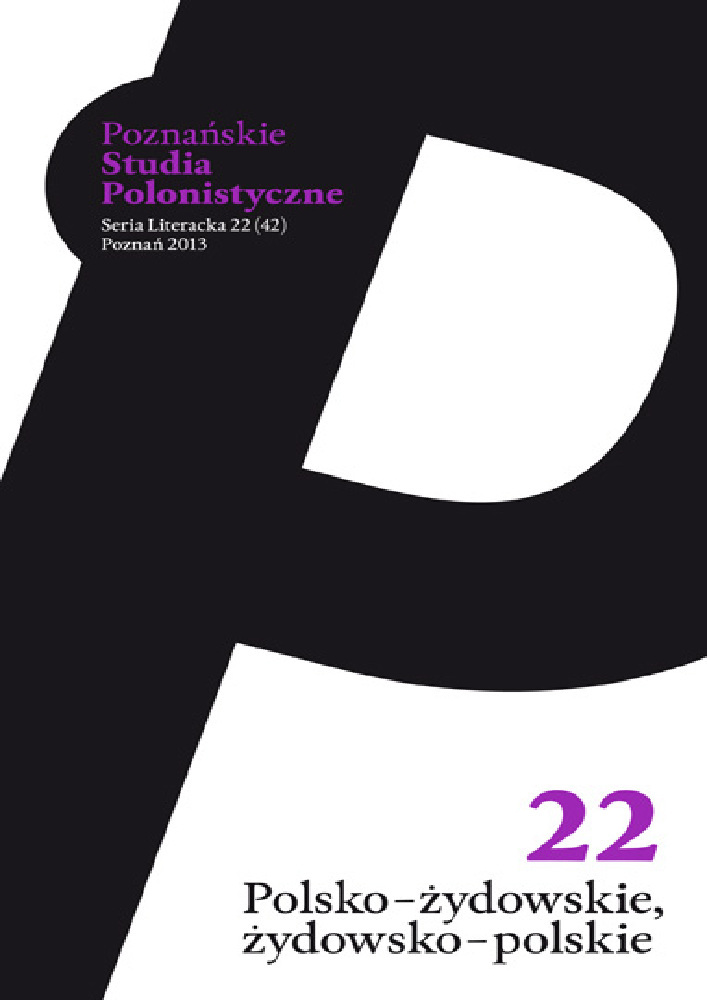Abstract
The main statement of the article is that Polish-Jewish and Jewish-Polish biographies have an ambiguous ontological status. The status, which the article describes as spectral, is traced in Polish literature over the last twenty four years (from mid-80s till now). Three conventions have been identified, which, because of their openness to ontologically incomplete beings, are good expressions of complications of biography and identity. The conventions are romance, genealogy, and horror. The writers who use these conventions aim at representing a concrete Polish-Jewish or Jewish-Polish biography, but the phantasmatic quality of combination of what is Polish with what is Jewish leads to unreality of all elements of a novel. Consequently, not only Jewish characters and Jewish identity, but also Poles and Polish identity become phantasmatic.References
Epstein H., Children of the Holocaust. Conversations with Sons and Daughters of Survivors, New York 1988.
Głowiński M., Czarne sezony, Warszawa 1998.
Głowiński M., Kręgi obcości. Opowieść autobiograficzna, Kraków 2010.
Grupińska A., Ciągle po kole. Rozmowy z żołnierzami getta warszawskiego, Warszawa 2000.
http://lewica.pl/index.php?id=27900 [dostęp: 20 kwietnia 2013].
Keff B., Utwór o Matce i Ojczyźnie, Kraków 2008.
Konwicki T., Bohiń, Kraków 1986.
Kowalska-Leder J., Doświadczenie Zagłady z perspektywy dziecka w polskiej literaturze dokumentu osobistego, Wrocław 2009.
Krall H., Sublokatorka [1985], Warszawa 1989.
Krawczyńska D., Własna historia Holokaustu. O pisarstwie Henryka Grynberga, Warszawa 2005.
Lederowie S. i W., Czerwona nić. Ze wspomnień i prac rodziny Lederów, Warszawa 2005.
Nowicki S., Pół wieku czyśćca. Rozmowy z Tadeuszem Konwickim, „Przedświt”, Warszawa 1986.
Olczak-Ronikier J., W ogrodzie pamięci, Kraków 2001.
Ostałowska L., Mój Murzyn zawsze jest biały, w: eadem, Bolało jeszcze bardziej, Wołowiec 2012.
Polskie gadanie [z M. Głowińskim rozmawia T. Torańska], „Duży Format” [dodatek], „Gazeta Wyborcza” 2005, nr 19.
Rosiak D., Człowiek o twardym karku. Historia księdza Romualda Jakuba Wekslera-Waszkinela, Wołowiec 2013.
Rymkiewicz J.M., Umschlagplatz, Warszawa 1988.
Toeplitz K.T., Rodzina Toeplitzów. Książka mojego ojca, Warszawa 2004.
Tuszyńska A., Rodzinna historia lęku, Kraków 2010.
Tuwim J., My Żydzi polscy…, w: Pieśń ujdzie cało… Antologia wierszy o Żydach pod okupacją niemiecką, oprac. M.M. Borowicz, Lublin 2012.
License
Authors
Authors of texts accepted for publication in „Poznańskie Studia Polonistyczne. Seria Literacka” are required to complete, sign and return to the editor's office the Agreement for granting a royalty-free license to works with a commitment to grant a CC sub-license.
Under the agreement, the authors of texts published in „Poznańskie Studia Polonistyczne. Seria Literacka” grant the Adam Mickiewicz University in Poznań a non-exclusive, royalty-free license and authorize the use of Attribution-NoDerivatives 4.0 International (CC BY-ND 4.0)Creative Commons sub-license.
The authors retain the right to continue the free disposal of the work.
Users
Interested Internet users are entitled to use works published in „Poznańskie Studia Polonistyczne. Seria Literacka” since 2016, for non-commercial purposes only, under the following conditions:
- attribution - obligation to provide, together with the distributed work, information about the authorship, title, source (link to the original work, DOI) and the license itself.
- no derivatives - the work must be preserved in its original form, without the author's consent it is not possible to distribute the modified work, such as translations, publications, etc.
Copyrights are reserved for all texts published before 2016.
Miscellaneous
Adam Mickiewicz University in Poznań retains the right to magazines as a whole (layout, graphic form, title, cover design, logo etc.).
